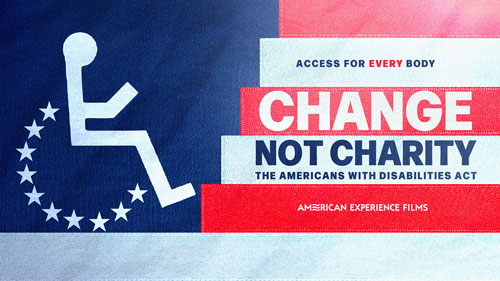Here on the Enabling Devices blog, we’ve often written about the Americans with Disabilities Act (ADA). But what led to the landmark legislation that dramatically altered life for people with disabilities in the United States?
A new PBS documentary called “Change, Not Charity” tells the remarkable story of how the ADA came to be. The film premieres on PBS stations on March 25 at 9 p.m. EST as part of the station’s “American Experience” series.
This July, the ADA turns 35. Signed by President George H.W. Bush on July 26, 1990, it was the culmination of decades of work by activists who demanded that disabled people have equal access to the same rights and privileges of other Americans.
“While curb cuts, ramps at building entrances, and braille on elevator buttons seem commonplace today, they were once the subject of a pitched battle that landed on the steps of Congress,” explains PBS.
Directed by Jim LeBrecht, best known for the Oscar-winning film “Crip Camp” and narrated by actor Peter Dinklage (Game of Thrones), the documentary uses archival footage and interviews to explore the history of the disability rights movement of the late 20th century. The movement culminates in the “Capital Crawl,” an action by grassroots disability rights organization ADAPT—American Disabled for Accessible Public Transit—on March 12, 1990, in which a large group of protesters including wheelchair users climbed on their hands and knees up the steps of the Capital. Once at the top, the protesters, who carried copies of the Declaration of Independence in their pockets, presented them to lawmakers on the hill. Six months later President Bush signed the ADA.
In an interview with Disability Scoop, LeBrecht, who was born with spina bifida, said “the message of this film is that civil rights for people with disabilities are just as important as the rights that everyone either has or should have in our society.”
Added LeBrecht: “There was a coming together of many people, disabled and non-disabled people. Legislators from both sides of the aisle came together in a bipartisan fashion… I hope that our film will remind our viewers and those in power, that preserving the civil and human rights of people with disabilities benefits everyone.”
While it’s impossible to minimize the importance of the ADA, it also must be acknowledged that the legislation was far from perfect. When it comes to disability rights, the United States still has a long way to go. As Anita Cameron, one of the protesters who participated in the Capital Crawl, put it on PBS.org: “I think a lot of people forget that the ADA was the floor. It was not the ceiling. So, it was the beginning of rights for us, but it was not the end.”


